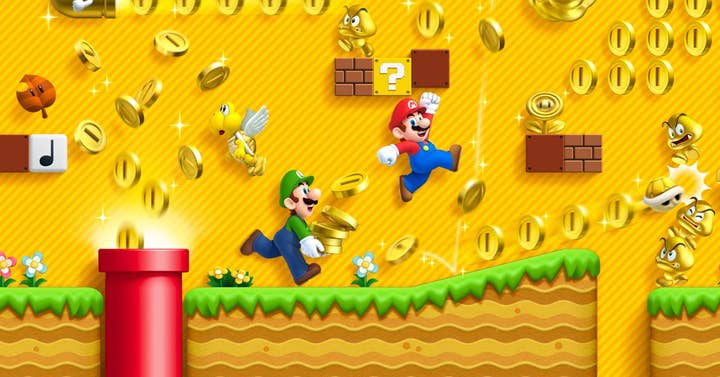Analysts: “The games industry is not going anywhere” in the face of a recession
The business of video games is expected to show resilience in the event of an economic downturn, although some areas will feel the effects
The Western markets are likely heading towards a recession -- one that will inevitably impact the video games industry.
The extent of that impact has been discussed already -- including on this very site. Twice, in fact. And yet the prospect of an economic downturn remains something that warrants considering. While the industry has previously been dubbed 'recession-proof,' a lot has changed since the 2008 recession and our own Rob Fahey is less convinced the industry will remain unscathed if things do take a turn for the worst.
Whether or not there will even be a recession is still up for debate. Karol Severin, Midia Research's head games analyst, believes it is inevitable.
"Signs were already there in 2019 -- even before the effects of COVID, logistics/supply chain issues, cost of living crisis and Russia's ongoing invasion of Ukraine," he tells GamesIndustry.biz. "From the consumer point of view, you can argue the tough times are already very much being felt as the cost of living crisis continues, along with high inflation and growing interest rates which are to affect mortgage payments, and therefore wider disposable income on things like entertainment.

"Things will likely keep getting progressively worse until the end of the year at the minimum, and likely for months after that. Consumers, however, may feel the effects of it all for much longer."
Ampere Analysis' games research director Piers Harding-Rolls argues a recession is "not guaranteed" at this point, but does note that the macroeconomic situation is likely to disrupt millions of people's spending habits in the near future.
"Inflation and the cost of living squeeze is being felt broadly across all major sales territories, so even if we are not technically in a recession yet, the impact is already far-reaching and is likely to last until the squeeze starts to ease -- perhaps later this year or early 2023," he explains.
"The situation has been exacerbated because of Russia's unjust invasion of Ukraine and specifically the UK has shot itself in the foot over Brexit, which has also added to distribution and import costs and added to inflation for UK consumers."
Harding-Rolls adds that Russia was the tenth biggest games market in the world in 2021, with publishers' efforts to pull their products from the region in response to the invasion likely to have an impact on the global market value.
Dr Serkan Toto of Kantan Games notes that, whether or not an economic downturn occurs in the next 12 to 18 months, he is "not worried at all."
"On mobile, most games are free-to-play anyway," he reasons. "On console, we have subscription services like Game Pass or PlayStation Plus for people who need to control their entertainment budgets. The PS5 and the Xbox Series X/S are in such high demand that a recession will not put a serious dent in Sony or Microsoft's hardware business either.

"On the PC, there are tons of free or low-priced games, too. In case a recession hits, will the one or other gamer skip or postpone the purchase of a new $70 game? Perhaps, but I think that overall, the industry will do just fine."
Tom Wijman, Newzoo's head of reports and forecasting, also expects the games industry to weather any kind of recession "fairly well." Compared to other forms of entertainment, such as going to the cinema, video games represent good value for money -- especially factoring the shift to longer-tail business models.
"I expect that the least affected will be those already well positioned as live service or those that offer a subscription model, such as Riot Games and Microsoft, to give two examples," he says.
"That isn't to say there will be no effect at all. The mobile gaming industry has faced a headwind recently, with privacy changes challenging its user acquisition model. But that did not affect their current converted users as they didn't need to be acquired. A possible recession leads to people evaluating their leisure spending and could impact this revenue stream a lot. That effect will be noticeable, though not nearly as impactful, for games with higher conversion rates."
Harding-Rolls notes that 2022 is "looking more unsettled than it did at the beginning of the year" -- particularly since the delays of major tentpole releases such as Starfield and the Breath of the Wild sequel. Ampere Analysis now expects the global games market to see decline this year, but that growth will return in 2023.
Diving into specifics, the research firm expects PC revenues to decline by 3% year-on-year, while console is expected to remain flat -- although further delays could impact the sector's performance in the second half of the year. High priced hardware, from consoles to gaming PCs to virtual reality headsets, are likely to be impacted by the cost of living increase. Meanwhile, the nascent cloud gaming segment, which relies on subscriptions, is expected to grow strongly, albeit from a very small base.

Mobile gaming, by far the biggest segment of the market, is expected to decline by 1.3% in 2022 -- due not only to the economic climate, but also the aforementioned challenges introduced by changes to platform holders' privacy settings. Harding-Rolls adds that there are two specific areas of mobile gaming that publishers will need to watch closely as the global economy slows down.
"One is advertising, both as a revenue stream and also as a user acquisition strategy," he explains. "Reduced advertiser spend means that games companies that rely heavily on advertising revenue -- hypercasual games publishers for example -- may, in the short term, see a reduced scale in their business.
"The other area is engagement and monetisation of whales and high spenders. With on average less than 2% of users being monetised in free-to-play games through IAP, the mobile games market relies heavily on these players to scale revenues. It is inevitable that a slowdown will have a negative impact on a portion of these high spenders, which might result in a reduced spending level for those affected and an overall decrease in the volume of these consumers."
Midia's Severin is a little more optimistic. While his firm expects the rate of growth to slow, it doesn't expect a decline in global games spending (apart from in Russia and Ukraine, of course). The engagement-centric business models that currently dominate the industry stand to do well, so while sales of individual, full-price games may suffer, free-to-play games and streaming services may end up being viewed as money-saving, or at least value-generating, pastimes by consumers.
"The consumer mindset will be about moving from spending £150 on two AAA games, for example, to spending £120 per year to get access to hundreds of games," Severin says. "And with the likes of recession busters, such as Xbox All Access, and the declining need to even have to own a console, I expect games subscription services to do well. Namely I think the Xbox ecosystem is set up to be a real winner during these times.

"More broadly, larger and diversified tech/entertainment companies with strong cash positions and a multitude of revenue channels beyond selling individual games are better positioned to weather the storm than pure-play games publishers and developers. Tech majors are likely to gain influence -- and market share -- in the games industry over the coming years. This will likely be underlined by more M&A activity, as pure-play games publishers might find their share prices/valuations squeezed by recessionary pressures -- which will make them more attractive to acquire."
It's impossible not to think back to the collapse of 2008; despite past claims that the industry is 'recession-proof,' that period undeniably took its toll on games companies, leading to the closures of Midway Games, Free Radical Design and Factor 5 (to name but a few) as well as layoffs at leading firms like EA and PlayStation.
But Harding-Rolls says the complexity of the sector today makes direct comparisons to the previous major downturn "problematic."
"The fact that the games sector is now as broad as it is suggests that there is likely to be more cases where a cost-of-living squeeze will impact consumption," he says. "Stating that the games sector is 'recession proof' is really a fallacy -- it is relatively highly insulated from impact as during downturns people find great value in playing games but there are areas which will still be impacted."
Newzoo's Wijman adds: "In comparison to other forms of entertainment, we see the spending in the games market to be resistant to a recession. During the last major recession, the major publishers felt the impact but the overall market still grew -- particularly as mobile gaming stormed the market. This time, we see the market being resilient to a recession because there are so many ways people can spend -- premium, microtransactions, subscriptions -- and there's so much content available for a smaller investment."
Even purchasing hardware, he argues, is no longer the requirement it once was now that we see cloud gaming options start to emerge. Wijman expects some markets and segments of the market to see "temporary setbacks" and 2022 is unlikely to see the growth numbers of the past two years, but with an overall growing playerbase, a wider variety of price points for a wider variety of content, and alternatives to upfront payments, Newzoo believes in "continued growth of the games market."
Severin is equally optimistic, concluding: "The games industry is not going anywhere. But its dynamics will continue to evolve, away from a title sales dominated approach towards engagement-centric business models, subscriptions and in-game spending. And in doing so, influence and market shares across the games industry value chain will also adjust over time."

